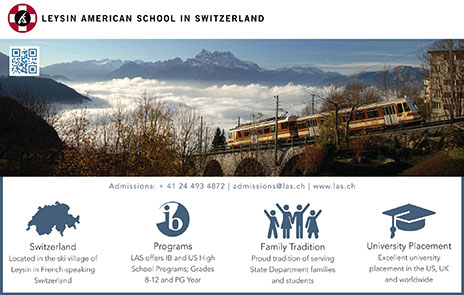Mental Health Support for Foreign Service Children: Parents Weigh In
FS children are just as at risk for mental health problems as the average American child, perhaps even more vulnerable. This is a critical issue for FS families.
In preparing the focus on mental health care for the Foreign Service in the January-February issue of the FSJ, we invited members to respond to a set of questions concerning their experience with mental health services. Due to the sensitive nature of the subject, and known concerns about privacy, we took the unprecedented step of offering to print comments without attribution.
Based on the significant and substantive response, it was clear that issues relating to support for family members, and particularly FS children, needed a separate discussion. Here then are the comments we received concerning mental health and special needs support for FS children, presented as an opener to that important discussion.
A vital aspect of this topic, support for FS children diagnosed with special needs, is addressed in this month’s Speaking Out column.
—The Editors
The Video Option
In many locations, mental health services are poor. Language barriers only worsen this situation. The regional psychiatrist is capable of providing digital video camera (DVC) counseling, and other services such as the Employee Consultation Service also help. There are very insufficient services for children. Most local child psychiatrists speak a different native language than the children and are of no help. The regional psychiatrists are more capable of assisting adults. This leaves the children without needed services.
Psychiatry and counseling can be effectively conducted remotely using DVC if parents and schools are supportive. It should be mandatory that each post have this capacity.
Punished for Being Proactive
It isn’t easy uprooting our families every couple of years without knowing where we’ll end up next or what life will be like in the varied countries around the world.
At times, I find mind-boggling what it takes to lobby for jobs around the world, get settled into a new home, develop relationships with new bosses and colleagues and then start the process over again. Our children have the same struggles, but their little minds aren’t yet ready to cope with all of the stresses they often go through.
Our first assignment was to a 35-percent hardship post, a difficult place to live. We couldn’t drink the water. The school for our kids wasn’t particularly good; it was like a one-room schoolhouse and offered no sports. There were Muslim extremist groups in the country, so security threats were always on our minds. Our house was surrounded by a huge concrete wall, and the feeling of being shut off from the world around us wasn’t easy on any of us.
That said, we stayed positive, made the best of some tough situations and turned it into a lovely first-tour experience for the family. While at post, we set up several appointments with the regional psychiatrist (RMO/P) to meet with our kids. We received wonderful pointers, and it made a difference.
After leaving post, we considered finding a therapist to meet with our kids to help them with the transition. They were doing okay, but they were nervous about how our lives would change again. We asked the Bureau of Medical Services (MED) for recommendations on local providers in the Northern Virginia area, and chose one to see our youngest son, who was having the hardest time with the move. He was able to talk about his struggles and fears, and he showed much improvement. He learned how to better express his concerns to us, and we learned what to look for and do to help both of our kids assimilate into another new environment.
Because we were trying to be proactive with our kids, and because we thought MED had our best interest in hand, we reached out to them for support. We won’t do that again.
After we settled into our second posting, we found out that our youngest child’s medical clearance had been changed to Class 2. This happened directly after we asked for the continuing support in Northern Virginia and with no correspondence with us.
Since then, we have met with the RMO/P at every opportunity to demonstrate that our youngest child, now 15 years old, is doing very well. He has many friends, gets great grades, plays sports, gets along well with his classmates and teachers, and is a normal teenager. Yet we haven’t been able to get his clearance changed. We spent our entire second tour documenting his progress for the file, continuing to do so during a year of language training and the 18 months of our current (third) tour. Still no change.
We are being punished for trying to do the right thing for our kids. The only conclusion we’re left with at this point is that we never should have involved MED to begin with. We could have found a therapist on our own and done just as well, and we wouldn’t be having these clearance issues now. Because we were trying to be proactive with our kids, and because we thought MED had our best interest in hand, we reached out to them for support. We won’t do that again.
Delayed Symptoms
Currently, there are provisions for funding therapeutic boarding school, including medical evacuation from post, in lieu of normal tuition at post, when medically indicated and approved by MED. In many cases the behavioral issues, eating disorders, anxiety or depression that result in such actions stem from triggers related to the Foreign Service—the disruption of life, school, work and social networks caused by repeated moves. Each year numerous middle and high school students become symptomatic at post, are medically evacuated for psychiatric evaluation and are then funded for attendance at therapeutic boarding schools.
The problem is that in many cases the symptoms are suppressed or delayed—a child might withdraw from friends but otherwise “pass” as normal for months or even a year or two before symptoms erupt and become debilitating in terms of inability to thrive in the home, school or other environments. In other words, the harmful effects aren’t noticed until the child is no longer posted overseas with the employee. Yet the trigger is still often the realities of moving—especially during teenage years.
The State Department’s view is that such cases are the responsibility of the local education authority (school district). It is up to the local school district to develop an individual education plan (IEP) per federal law and use funds provided by the U.S. Department of Education to support special needs education. The reality, however, is that the process to obtain funds is not well developed in some districts, and can take a year to sort out. Often it’s only the threat of litigation that results in bureaucratic action.
It’s as if military veterans were told that their post-traumatic stress disorder wouldn’t be covered by the Department of Veterans Affairs because it didn’t become debilitating until after they had returned from deployment.
Could the State Department provide a fund that covers such eventualities both overseas and domestically—especially for cases where the eruption of symptoms is traceable to service overseas and the disruption of moving? Such a benefit could be “secondary,” in the sense that any payments from the local education authority to the provider would reduce the benefit, just as when MED pays for medevac costs up front.
Consider the Military Model
The State Department should modify its mandate to cover therapy and therapeutic boarding school for Foreign Service dependents in cases of anxiety, depression, eating disorders or PTSD where the cause or trigger is linked to overseas service (employee or family member). Sometimes symptoms only occur after a return to the United States.
Why not use a military model, which does not restrict treatment for PTSD to those whose symptoms become apparent during overseas deployment prior to returning stateside? I realize that the statutory authorities are different, and I understand that the State Department’s traditional view is that it is the responsibility of state government and school districts in the United States to cover services not provided under Federal Employee Health Benefits once the employee returns. That said, there are discrepancies in benefits that are not covered even when the mental health challenges clearly result from a family’s prior overseas service.
It’s as if military veterans were told that their PTSD wouldn’t be covered by the Veterans Administration because it didn’t become debilitating until after they had returned from deployment.
In the past, some employees have secured additional benefits through lawsuits. But why not set up a fund to cover treatment related to service overseas, irrespective of whether the employee or family member becomes symptomatic prior to departure from post? The key is that the condition was caused by (or exacerbated by) the family’s time overseas in the service of the department.
Make Special Needs Support Routine
State Department cable 2015 State 676656, under “special educational needs,” states: “Children with special educational needs are at higher risk than their peers for mental health conditions. They are especially prone to depression and anxiety, but might suffer from more serious mental health conditions. Support to these children should be as focused and routine as for any other health condition.”
Yet my child has been turned down for intervention included in his IEP, decreasing his ability to understand direction and instruction and fully function as a member of the classroom. My child’s self-esteem is suffering as a result. His anxiety over attending school is increasing. His teacher is running out of patience, and this affects how she treats him throughout the day, how peers perceive and treat him, as well as how he sees himself.
I think MED really tries to try to meet the mental health needs of our special education children, but it sometimes seems like the right hand and left hand are not working together, maybe because they work out of separate pots of money. Shouldn’t the overall well-being of the child be more important?
Those handling the Special Needs Education Allowance funds need to pay attention to the health care provider and be more respectful of those professionals at post who know and interact with the child. Having your child’s school needs met should not be a parent’s full-time job.
Focus on the Kids
When our daughter had a difficult time adjusting to the United States as she began college in 2010, we consulted the embassy health unit during one of her visits to post. They referred her to a local provider who recommended follow-on treatment in the United States.
The health unit’s response was helpful, based on knowledge of local providers. I do not know if they also discussed the issue with the nonresident RMO/P, but we did meet with him during one of his visits to post (without our daughter present). He seemed dismissive of the diagnosis she got in the United States, but did not provide any specific advice or support regarding referrals or resources.
The only time in my 30-year career that I saw an effort to seriously address family mental health concerns was under Dr. Elmore Rigamer’s leadership. His effort to raise awareness, educate and obtain research to mitigate and treat mental health conditions was exemplary. Now there are significantly more staff in MED, but their policies and services are not clear. There seems to be no specific attention to children and adolescents, as there was in the 1990s under Dr. Rigamer’s leadership.
I was delighted to hear last year that the relatively new Child and Family Program office was staffed with child specialists, but their mission is not clear and is already being truncated. I have heard from families who benefited from CFP support that enabled them to complete their assignments and access necessary treatment (including therapeutic boarding schools or other U.S. resources). I’ve also heard that CFP mitigated mental health situations through video consultations, which is well-suited to the Foreign Service population and fulfills MED’s commitment to telemedicine.
There is a growing perception among FS families that any indication of a mental health concern in a child is cause for immediate medevac. This funnels people directly into a hospital environment, which may not be the optimal setting for a juvenile or for the family. I don’t see any effort to mitigate mental health conditions through education, training and provision of resources to help families and communities create a positive environment. Nor is there support for families returning to the Washington, D.C., area who need to find specialized professional services.
There is a growing perception from FS families that any indication of a mental health concern in a child is cause for immediate medevac. This funnels people directly into a hospital environment, which may not be the optimal setting for a juvenile or for the family.
I have heard some parents say they would not disclose children’s mental health concerns in order to avoid limiting their availability to serve overseas. Employees do not have a solid understanding of the medical clearance process when it involves mental health issues. Some arrive at post without adequate local support.
The Youth Mental Health Initiative, which was started in February 2015, was based on officer-parent perceptions that there are significant mental health concerns among FS youth. The initiative led to a worldwide cable and webinar that outlined existing resources. But efforts to build on this were suddenly stopped by some participating offices, despite earlier agreement. Why?
Getting Cut Off
I am a State annuitant and my wife is active-duty Foreign Service. When my son was 13, I took him, at MED expense, from post to Washington, D.C., to meet with a psychologist and a psychiatrist where he was diagnosed with attention deficit disorder (ADD). Back at post and at subsequent posts, the health unit would provide a prescription for ADD medication that he would take on school days. He would also regularly talk with the regional psychiatrist.
After graduation from high school at our present post, my son went on to a U.S. liberal arts college. He continued to meet with the RMO/P when on breaks from college. When my son missed a visit to post and I attempted to get a new 90-day prescription for his medication from the post health unit, the new RMO/P dismissed me, saying: “We do not know this young man, and we will not write him a prescription”—even though MED and the post health unit had extensive records on my son.
When my son came to post for his winter break, he met with the new RMO/P, who was willing to write him a single, 60-day prescription and said that my son would have to find a psychiatrist in the “local community” near his college to continue getting his medication, that MED should not be writing prescriptions for psycho-stimulants for him. We fully agreed that when our son completed college, he would need to find a local psychiatrist to take over his case. We hoped once he was out of an academic environment, he would not need to take such medication. (And this has been the case.)
But at the point when he was cut off from prescriptions, he was a junior in college and not part of the local community. The college health unit did not normally take such cases, so it was problematic for my son to be “dropped” by the post health unit at this stage, with three more semesters to go. We were worried about him graduating. We had made a tremendous financial investment in his education, and we wanted to see him graduate successfully on time. We contacted MED in the State Department and explained that we were not looking for a “blank check,” but would like to see the post health unit prescribe and monitor for our son until he graduated from college. MED said no.
Fortunately, the college health unit agreed to prescribe the medicine for him and monitor him until he graduated, so this worked out. But we remain aggrieved by MED and the post health unit’s precipitous and unempathetic treatment of our son.
Suicidal Teen
As a licensed clinical social worker (LCSW) married to an FSO, I know how essential mental health care is for many people. We are at our first post. My teenage son became suicidal after we moved to post. He had a history of depression. The consulate leadership and regional psychiatrist worked quickly to connect us to SNEA, a resource to pay for education (in this case residential treatment with a school on site) for children of FS employees.
Our son received much better care than we could have afforded on our own and is doing well at a private school that is also being funded by SNEA. One advantage is that we have access to excellent services in English for our son; SNEA paid for an educational consultant who helped us make sound choices.
We did not, however, get much help before we arrived at post. Because our son had a history of depression, we had been required to obtain outpatient services for him in advance of moving here, which we did. However, the regional psychiatrist at that time had only one local referral on the U.S. side, and that person was no longer available. We had to find a therapist and psychiatrist on our own. We learned the hard way that we did not choose particularly well.
I would recommend that the State Department hire or contract with local therapists or LCSWs to work in tandem with the RMO/Ps around the world, not just in hot spots. The therapists could offer individual, family and group services in person, traveling to various posts as nurses do, as well as through a secured Skype-type line. They could also make themselves familiar with local resources in their region.
The department appears to recognize that supporting stable family life is critical to the overall mission of the Foreign Service. But it struggles to provide that support in concrete ways, including easily accessible mental health care and transition support for families.





